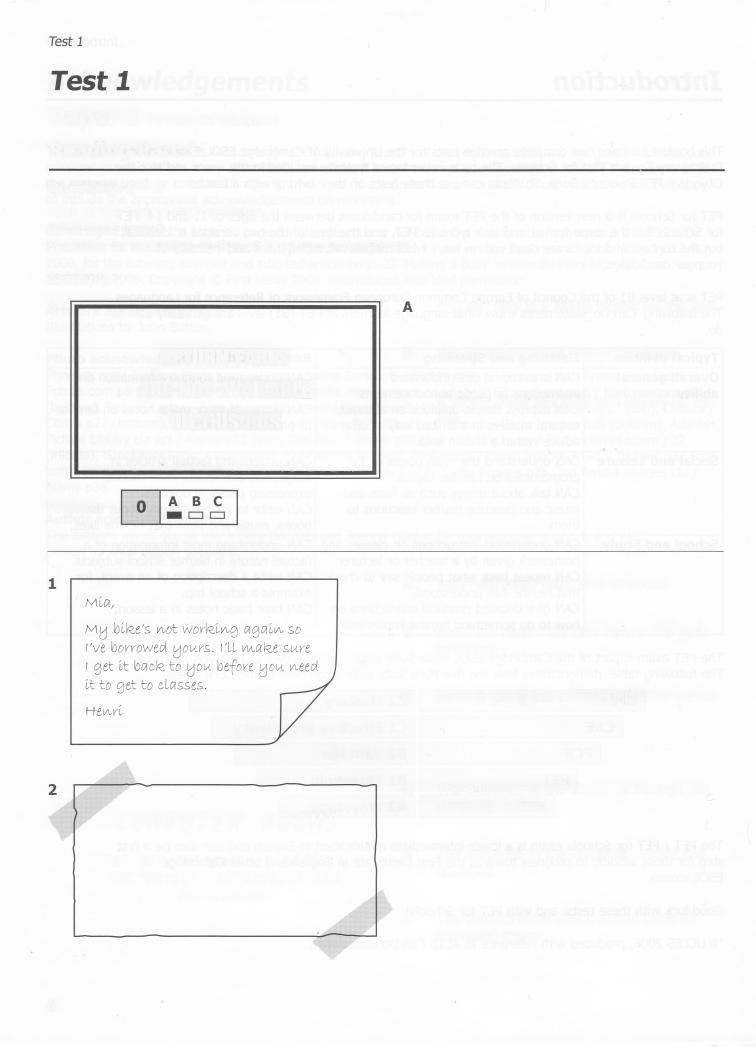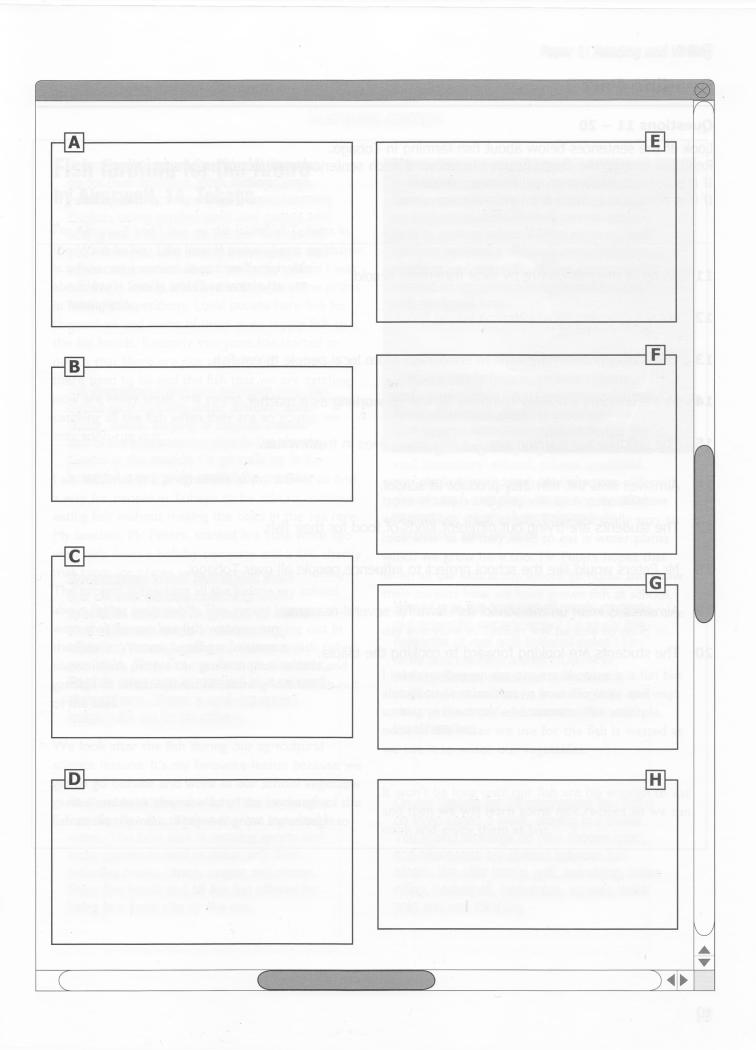Примеры заданий для экзамена PET Sample papers (Preliminary English Test) или PET for Schools Sample papers можно найти ниже Current papers (version 2020):
PET (Preliminary English Test)
Reading and Writing
Preliminary 2020 Sample test Reading — Answers
Preliminary 2020 Sample test Reading — Question paper
Preliminary 2020 Sample test Writing — Question paper
Speaking
Preliminary 2020 Sample tests Speaking — Question paper
Listening
Preliminary 2020 Sample test Listening — Question paper
Preliminary 2020 Sample test Listening — Script
Preliminary 2020 Sample test Listening — Answers
Listening introduction to the test and all 4 parts together
PET for Schools
Reading and Writing
PET 2020 Sample test Reading — Answers
PET 2020 Sample test Reading — Question Paper
PET 2020 Sample test Writing — Question Paper
Speaking
PET 2020 Sample test — Speaking
Listening
PET 2020 Sample test Listening — Answers
PET 2020 Sample test Listening — Question Paper
PET 2020 Sample test Listening — Script
Listening introduction to the test and all 4 parts together
Past papers (up to 2020)
Reading and Writing
PET Sample paper 2 Reading and Writing
PET Sample paper 2 Reading and Writing answer key
Speaking
PET Sample paper Speaking part 1
PET Sample paper Speaking part 2
PET Sample paper Speaking candidate’s booklet
PET Sample paper Speaking part 3-4
Listening
PET Sample paper 2 Listening
PET Sample paper 2 Listening tapescript
PET Sample paper 2 Listening answer key
Listening introduction to the test and all 4 parts together
Part 1
Part 2
Part 3
Part 4
Past papers:
Reading and Writing
PET Sample paper 1 Reading and Writing
PET Sample paper 1 Reading and Writing Answers
Speaking
PET Sample paper 1 Speaking Part 1
PET Sample paper 1 Speaking Part 2
PET Sample paper 1 Speaking Part 3
PET Sample paper 1 Speaking Candidate booklet
Listening
PET Sample paper 1 Listening
PET Sample paper 1 Listening Answers
PET Sample paper 1 Listening tapescript
Listening introduction to the test and all 4 parts together
Part 1
Part 2
Part 3
Part 4
Дополнительные вопросы к части Listening на проверку понимания устной речи:
Part 1
-
- How old is Nick? Did he get many presents? How many guests were there at the party? Did they have a cake? Was it a present? What did Nick get from his parents?
-
- Are the boys in the picture twins? Is there the woman in the picture too? Is one boy taller than the other? What is the only difference between the boys?
-
- What was the teacher’s question about? When was the chirch completed? When was the museum built? When was the bridge built? How much time did the teacher give the students to count?
-
- What is Jake’s hobby? What did he break? What was wrong with his arm? Did Nick like the nurses in the hospital?
-
- What did one of the girls want to try out? Why didn’t they want to play outside? What was wrong with the weather? Where did they decide to go? What time did they agree to meet?
-
- Which costume was too casual? Which one was too smart? Did Sally take her friend’s advice?
-
- Was the family going to visit an island? Is that possible to get to the island by car? What was the original plan? Why did they change their mind? Did the family like their holiday?
Practice for your speaking exam
PET SPEAKING PART 2 SAMPLE CARDS/КАРТОЧКИ #1
PET SPEAKING PART 2 SAMPLE CARDS/КАРТОЧКИ #2
PET SPEAKING PART 2 SAMPLE CARDS/КАРТОЧКИ #3
PET SPEAKING PART 3 SAMPLE CARDS/КАРТОЧКИ #1
PET SPEAKING PART 3 SAMPLE CARDS/КАРТОЧКИ #2
PET SPEAKING PART 3 SAMPLE CARDS/КАРТОЧКИ #3
You might also like:
PET Books/Книги для подготовки
PET Word list/Список слов
You can get more information from the official website
Skip to main content
English Language Assessment
We use cookies. By continuing to use this website you are giving your consent for us to set cookies Dismiss

A1 – Elementary
Practice Grammar Tests for A1 with Answer
A2 – Pre-intermediate
Practice Grammar Tests for A2 with Answer
B1 – Intermediate
Practice Grammar Tests for B1 with Answer
B2 – Upper-intermediate
Practice Grammar Tests for B2 with Answer
C1 – Advanced
Practice Grammar Tests for C1 with Answer
Pre-A1 – STARTERS
Practice Listening Tests for STARTERS with Answer & Audioscript
A1 – Elementary
Practice Listening Tests for A1 with Answer & Audioscript
A2 – Pre-intermediate
Practice Listening Tests for A2 with Answer & Audioscript
B1 – Intermediate
Practice Listening Tests for B1 with Answer & Audioscript
B2 – Upper-intermediate
Practice Listening Tests for B2 with Answer & Audioscript
Pre-A1 – STARTERS
Practice Reading Tests for STARTERS with Answer
A1 – Elementary
Practice Reading Tests for A1 with Answer
A2 – Pre-intermediate
Practice Reading Tests for A2 with Answer
B1 – Intermediate
Practice Reading Tests for B1 with Answer
B2 – Upper-intermediate
Practice Reading Tests for B2 with Answer
A1 – Elementary
Use of English Tests for A1 with Answer
A2 – Pre-intermediate
Use of English Tests for A2 with Answer
B1 – Intermediate
Use of English Tests for B1 with Answer
B2 – Upper-intermediate
Use of English Tests for B2 with Answer
Pre-A1 – STARTERS
Practice Writing Tests for STARTERS with Answer
A1 – Elementary
Practice Writing Tests for A1 with Answer
A2 – Pre-intermediate
Practice Writing Tests for A2 with Answer
B1 – Intermediate
Practice Writing Tests for B1 with Answer
B2 – Upper-intermediate
Practice Writing Tests for B2 with Answer
Key (KET) Listening Tests
Practice KET Listening Tests with Answer & Audioscript
i
Key (KET) Reading & Writing Tests
Practice KET Reading and Wrting Tests with Answer
Preliminary (PET) Listening Tests
Practice PET Listening Tests with Answer & Audioscript
First (FCE) Listening Tests
Practice FCE Listening Tests with Answer & Audioscript
CAE Listening Tests
Practice CAE Listening Tests with Answer & Audioscript
A1 – Elementary
Practice Vocabulary Tests for A1 with Answer
A2 – Pre-intermediate
Practice Vocabulary Tests for A2 with Answer
B1 – Intermediate
Practice Vocabulary Tests for B1 with Answer
B2 – Upper-intermediate
Practice Vocabulary Tests for B2 with Answer
Here are various activities to practice for the B1 Preliminary Exam (PET) for students working toward an intermediate level on the CEFR scale.
What can students do at B1 Preliminary Level? Reaching this level means that students have mastered the basics in English and now have practical language skills for everyday use.
- CAN understand routine information and articles,
- CAN write letters or make notes on familiar or predictable matters.
- CAN understand straightforward instructions or public announcements.
- CAN express simple opinions on abstract/cultural matter.
Our placement test for schools is a free placement test designed for students between the ages of 13 and 16 years old. It will take about 25 minutes to complete and it will suggest which Cambridge English course to follow.
- Reading Part 1 & 2
- Reading Part 3 & 4
- Reading Part 5 & 6
- Writing Part 1
- Writing Part 2
Part 1 — Read five real-world notices, messages and other short texts for the main message.
Part 2 — Match five descriptions of people to eight short texts on a particular topic, showing detailed comprehension.
Part 3 — Read a longer text for detailed comprehension, gist, inference and global meaning, as well as writer’s attitude and opinion.
Part 4 — Read a longer text from which five sentences have been removed. Show understanding of how a coherent and well-structured text is formed.
Part 5 — Read a shorter text and choose the correct vocabulary items to complete gaps.
Part 6 — Read a shorter text and complete six gaps using one word for each gap.
Write about 100 words, answering the email and notes provided.
Write about 100 words, either an article or story.
Articles
Short Stories
In addition, we add listening and speaking exercises in order to practise for this part of the B1 Preliminary test (PET).
- Part 3 — Listening
- Part 4 — Listening
- Speaking
Part 3 — Gap-Filled Exercise
Part 4 — Multiple Choice Exercise
The B1 Preliminary Speaking test has four parts and you take it together with another candidate. There are two examiners. One of the examiners talks to you and the other examiner listens.
The more words you encounter and understand, the broader your day-to-day vocabulary will become. Our word games and puzzles are an excellent way to help to reinforce spellings in your mind at this B1 Preliminary Level (PET).
- Crosswords Puzzles
- Word Searches
- Word Puzzles
Especially helpful are exercises that are focussed on a theme or topic as these provide word retention practice so you can be confident to read, write, speak and listen successfully at this B1 Preliminary Level (PET)
- Vocabulary Skills
- Grammar Skills
- Writing Skills
- Speaking Skills
Cambridge English Examinations:
Cambridge English exams are designed for learners at all levels from the pre-intermediate level Cambridge English: Key (KET) to the very advanced level Cambridge English: Proficiency (CPE). These exams give candidates proof of their ability to use English in a wide variety of contexts, relevant to work, study and leisure activities.
A2 Key (KET) | B1 Preliminary (PET) | B2 First (FCE)
Добавил:
Upload
Опубликованный материал нарушает ваши авторские права? Сообщите нам.
Вуз:
Предмет:
Файл:
Скачиваний:
1659
Добавлен:
20.03.2016
Размер:
32.73 Mб
Скачать


OBJECTIVE
for Schools
Practice Test Booklet
WITH ANSWERS
Louise Hashemi
Barbara Thomas
UN I VE RSI TY PRESS

Contents
Contents
|
Acknowledgements |
4 |
|
|
Introduction |
5 |
|
|
Test 1 |
Paper 1 |
6 |
|
Paper 2 |
19 |
|
|
Paper 3 |
25 |
|
|
Visual materials for Paper 3 |
||
|
(Tests 1 and 2) |
26 |
|
|
Test 2 |
Paper 1 |
30 |
|
Paper 2 |
43 |
|
|
Paper 3 |
49 |
|
|
Test 1 |
Key |
50 |
|
Test 2 |
Key |
57 |
|
Test 1 |
Paper 3 Examiner’s script |
65 |
|
Test 2 |
Paper 3 Examiner’s script |
69 |
3

Acknowledgements
The authors and publishers acknowledge the following sources of copyright material and are grateful for the permissions granted. While every effort has been made, it has not always been possible to identify the sources of all the material used, or to trace all copyright holders. If any omissions are brought to our notice, we will be happy to include the appropriate acknowledgements on reprinting.
Cambridge ESOL for the table on page 5 with reference to ALTE Can Do statements. Copyright © UCLES 2009; First News for the adapted article on p. 11 ‘Fish farming for the future’ written by Aimswell, First News 16-22 May 2008, for the listening exercise and adapted article on p. 22 ‘Making a buzz’ written by Piers Morgan, First News 16-22 May 2008. Copyright © First News 2008. Reproduced with kind permission.
Artwork acknowledgements
Illustrations by John Batten.
Photo acknowledgements
Phrysphotos / BigStockPhoto.com p8 (top), Galina Barskaya — Fotolia.com p8 (top middle), Anton Gvozdikov — Fotolia.com p8 (middle), Galina Barskaya — Fotolia.com (bottom middle), © iStockphoto.com / hartcreations p8 (bottom), Serena Lacey — First News p l l , Jeremy Woodhouse / Blend Images / Getty Images p27 (top), Cultura / Corbis p27 (bottom), Ian Murray / Alamy p29 (top), John Giustina / Iconica / Getty Images p29 (bottom), Adams Picture Library t/a apl / Alamy p32 (top), Ted Foxx / Alamy p32 (top middle), Lorey / BigStockPhoto.com p32 (middle), iStockphoto.com / aldomurillo p32 (middle bottom), Paul Burns / Blend Images / Getty Images p32 (bottom), Solarseven / BigStockPhoto.com p35, Balint Porneczy / AFP / Getty Images p36, Jon Arnold Images Ltd / Alamy p38
Author acknowledgements
The authors would like to thank Sara Bennett and Joanne Hunter for their editorial support, and eMC Design for their design solutions.
4

Introduction
Introduction
This booklet contains two complete practice tests for the University of Cambridge ESOL Examinations Preliminary English Test for Schools. The tests cover topics typically included in the exam and also the Objective PET Student’s Book. Students can use these tests on their own or with a teacher.
|
PET for Schools is a |
new version of the PET exam for candidates between the ages of 11 and 14. PET |
|
|
for Schools has the |
same format and task types as PET, and the level of the two versions is identical, |
|
|
but the content and topics are dealt with in ways which reflect the experiences and interests of |
||
|
younger candidates. |
||
|
PET is at level B1 |
of the Council of Europe C o m m o n European Framework of Reference for Languages. |
|
|
The following ‘Can |
Do’ statements show what language learners at PET ( B l ) level are generally able to |
|
|
do. |
|
Typical |
abilities |
Listening and |
Speaking |
|
Overall |
general |
CAN understand |
straightforward |
|
ability |
instructions or public announcements. |
||
|
CAN express simple opinions on abstract/ |
|||
|
cultural matters in a limited way or offer |
|||
|
advice within a known area. |
|||
|
Social and Leisure |
CAN understand the main points of TV |
||
|
programmes on familiar topics. |
|||
|
CAN talk about things such as films and |
|||
|
music and describe his/her reactions to |
|||
|
them. |
|||
|
School and Study |
CAN understand instructions on classes and |
||
|
homework given |
by a teacher or lecturer. |
CAN repeat back what people say to check that he/she has understood.
CAN give detailed practical instructions on how to do something he/she knows well.
Reading and Writing
CAN understand routine information and articles.
CAN write letters or make notes on familiar or predictable matters.
CAN understand factual articles in magazines and letters from friends expressing personal opinions.
CAN write to his/her friends about the books, music and films that he/she likes.
CAN understand most information of a factual nature in his/her school subjects. CAN write a description of an event, for example a school trip.
CAN take basic notes in a lesson.
The PET exam is part of the Cambridge ESOL Main Suite exams, which cover CEFR levels A2 to C2. The following table* demonstrates how the five Main Suite exams correlate to the CEFR levels.
|
CPE |
C2 |
Mastery |
|
CAE |
CI Effective proficiency |
|
|
FCE |
B2 Vantage |
|
|
PET |
Bl |
Threshold |
|
KET |
A2 |
Waystage |
The PET / PET for Schools exam is a lower-intermediate qualification in English and can also be a first step for those wishing to progress towards the First Certificate in English and other Cambridge
ESOL exams.
Good luck with these tests, and with PET for Schools!
*© UCLES 2008, produced with reference to ALTE Can Do statements.
5

P a p e r 1 (1 hour 30 minutes)
Reading Part 1
Questions 1 — 5
Look at the text in each question. What does it say?
Mark the correct letter A, B or C on your answer sheet.
Example:
0
|
RETURN FARES |
B |
|
ARE NOT AVAILABLE |
C |
|
ON THIS BUS |
You can only buy single tickets on this bus.
Return tickets must always be shown.
A return ticket will save you money on this bus.
Answer:
A Henri will leave Mia’s bike at school.
B Henri will return the bike before Mia goes to school.
C Henri is going out to meet Mia after school.
|
A The entrance to the library is through the |
||
|
COMPUTER |
ROOMS |
computer rooms. |
|
THE |
NEW E N T R A N C E IS |
B E T W E E N |
|
|
THE |
P H Y S I C S |
D E P A R T M E N T AND |
|
|
THE |
L I B R A R Y |
BThe entrance to the computer rooms has changed.
CThe physics department is now used as computer rooms.
6

STUDENTS WITHOUT MEAL TICKETS FOR TODAY MUST PAY FOR ALL FOOD, SNACKS AND DRINKS
O
ADD YOUR NAME TO THE LIST IF YOU WANT TO GO ON THE TRIP
Paper 1 : Reading and Writing
AYou cannot use a ticket to pay for your meal today.
|
B |
If you need a meal ticket, you can pay for |
|
it here. |
|
|
C |
You have to pay for meals if you don’t have |
|
a ticket. |
AThis list should be signed by people who want to go on the trip.
BIf you find your name on this list, you can go on the trip.
CThe list shows who is allowed to go on the trip.
ASome of Guido’s relatives are playing golf with him this weekend.
B Guido is preparing a surprise for his parents at their new home.
As the weather has improved, Guido wants Marc to play golf with him.
7

Test 2
Listening Part 4
Questions 6 — 1 0
The teenagers below all want to attend a summer camp in the UK.
On the opposite page there are descriptions of eight summer camps for young people. Decide which summer camp would be the most suitable for the following people.
For questions 6 — 10, mark the correct letter (A — H) on your answer sheet.
Nina and Peta would like to learn acting and singing skills. They’d also like to try a new sport. They’re happy to share a room with each other, but not with other people.
Mikki wants a part-time English course with opportunities to spend time outside trying different sports and activities. She wants family accommodation as she’s never stayed away from home before.
Hannu is hoping to find a holiday offering individual lessons with experienced tennis teachers. He also wants to improve his English and spend time with teenagers from other countries.
Benny and Tomas are very keen on science and would love to spend a week with teenagers who share their interest. They’d also like to be able to go swimming and watch films to relax.
Jean-Pierre loves going camping and reading books about spies. He’s looking for a holiday where he can share these interests and also spend time in the open air with other teenagers.
8

Paper 1 : Reading and Writing
Summer camps
Learn English where English children also go for their holidays. With ActionCamp, you’ll spend four mornings a week learning English, using graded tasks and games and acting out everyday situations. The rest of your time you take part in team sports and other outdoor activities. You’ll stay with
a friendly family who’ll entertain you at weekends.
All Rounders offers two activities each day. Spend each morning doing football, horse riding, tennis, singing or English lessons and in the afternoon try trips to the cinema, theatre or the seaside. Or go walking in the beautiful countryside around the campsite.
Sportcamp offers teenagers from the UK and abroad coaching from specialist teachers in groups or alone. Five different levels in swimming, athletics, tennis, golf and dance are
available. Plus, for our foreign students, English language is studied in a relaxed atmosphere. Share a well-equipped lodge with up to six others.
A t Summerfun you stay at the home of a local family with another student in a double room. You take part in exciting sports and water sports as well as other activities including music, dance, singing and drama. Enjoy the beach and all the fun offered by being in a lively city by the sea.
If you choose to attend a week’s training at Special Agents’ Camp, you will learn
how to use codes for secret messages, makeup and acting skills for undercover work, judo to protect yourself from enemies, and outdoor survival skills such as making fires, climbing and mountain biking, necessary for chasing or escaping. Sleep under the stars in well-equipped tents.
With its s a n d y beach, private cinema, and comfortable hostel accommodation,
|
Stake |
House is ideal for holiday fun . |
|
O u r |
special-interest c a m p s include film- |
making, using the purpose — built studio, a n d inventors’ school, w h e r e qualified a n d enthusiastic teachers help y o u choose and complete crazy engineering projects or original experiments in chemistry and physics.
W o u l d you like to paint all week, or carry out scientific experiments? Or study the methods of real and fictional spies? Or write and perform a play? C o m e to
Hobby Camp, meet our enthusiastic staff and make friends from England and around the world. A c c o m m o d a t i o n with local families.
On our Sports for All programme you focus on three sports a week, staying in a hostel. You spend mornings on your chosen sport, and afternoons are divided between two others. We offer tennis, golf, swimming, horse riding, basketball, badminton, squash, water polo and wall climbing.
9

Testl
Reading Part 3
Questions 11 — 20
Look at the sentences below about fish farming in Tobago.
Read the text on the opposite page to decide if each sentence is correct or incorrect. If it is correct, mark A on your answer sheet.
If it is not correct, mark B on your answer sheet.
11Some of the fish caught by local fishermen is sold.
12Local fishermen avoid catching young fish.
13The school programme aims to encourage more local people to eat fish.
14Mr Peters runs a holiday company as well as working as a teacher.
15The children are learning about a fish which lives in fresh water.
16Aimswell sells the fish they produce at school.
17The students are trying out different kinds of food for their fish.
18Mr Peters would like the school project to influence people all over Tobago.
19Aimswell is keen on the school fish farm for several reasons.
20The students are looking forward to cooking the tilapia.
10
Соседние файлы в предмете [НЕСОРТИРОВАННОЕ]
- #
- #
- #
- #
- #
- #
- #
- #
- #
- #
- #
Проверьте свое умение понимать английскую речь на слух с помощью следующих шести небольших диалогов. Похожие задания встречаются, например, в УМК Spotlight, а также в кембриджских экзаменах.
Нужно прослушать каждый диалог и щелкнуть мышкой по выбранному изображению. Ответы появятся сразу и поменять их уже будет нельзя. Но так как эти тесты тренировочные, перегрузите страницу сайта и попробуйте выполнить их еще раз.
К заданиям 4-6 перейдите по кнопке Next.
Попробуйте выполнить другие автоматизированные тесты раздела Аудирование.
Тест по аудированию на вставку пропущенных слов
People in London (2) (с видео) и другие.

